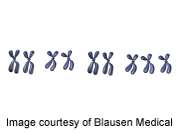Mechanism of maternal age effect on oocytes is questioned

(HealthDay)—New research suggests that the "production-line model" is not the basis for the maternal-age effect on trisomy, according to research published in the July 3 issue of the American Journal of Human Genetics.
Ross Rowsey, of Washington State University in Pullman, and colleagues conducted molecular cytogenetic studies using 191 samples of second-trimester human fetal ovaries to examine the number and distribution of crossover-associated proteins in more than 8,000 prophase-stage oocytes. The researchers looked for evidence supporting or refuting a key component of the "production-line model," stating that the first oocytes to enter meiosis have more recombination events (crossovers) than those that enter meiosis later in fetal life.
The researchers found that, although recombination levels varied among fetal samples, there was no evidence that they differ for oocytes entering meiosis early in fetal life compared with those that enter meiosis late in fetal life.
"Thus, our data provide a direct test of the second tenet of the production-line model and suggest that it does not provide a plausible explanation for the human maternal-age effect, meaning that—45 years after its introduction—we can finally conclude that the production-line model is not the basis for the maternal-age effect on trisomy," the authors write.
More information:
Abstract
Full Text (subscription or payment may be required)
Copyright © 2014 HealthDay. All rights reserved.

















